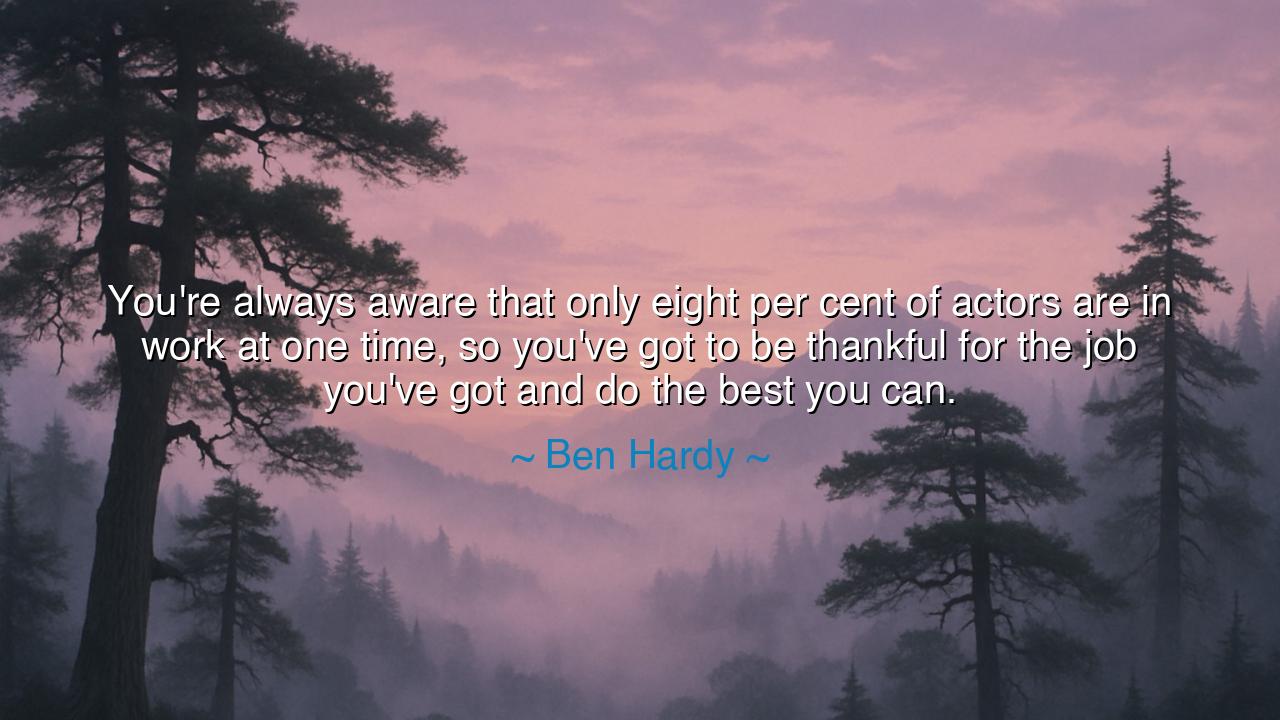
You're always aware that only eight per cent of actors are in
You're always aware that only eight per cent of actors are in work at one time, so you've got to be thankful for the job you've got and do the best you can.






In the words of Ben Hardy, there is a sobering wisdom joined with gratitude: “You’re always aware that only eight per cent of actors are in work at one time, so you’ve got to be thankful for the job you’ve got and do the best you can.” Though spoken plainly, these words carry the weight of truth that transcends the world of acting. They remind us of scarcity, of impermanence, and of the sacred duty to give one’s fullest effort when fortune shines. To be thankful for the job you’ve got is not weakness—it is the strength of one who understands the fragility of opportunity.
The number—eight per cent—is not only a statistic but a symbol. It tells us that the stage is narrow, the spotlight fleeting, and the ranks of those who yearn to stand upon it are many. In such a world, every role, every chance, every offering of work becomes a treasure beyond gold. Hardy’s words remind us that work itself is a privilege, not a guarantee, and that to treat it lightly is to risk losing the very ground beneath one’s feet.
This truth echoes across history. Consider the Roman general Cincinnatus, called from his plow to lead the armies of Rome. He did not seek the role, nor did he believe it was owed to him. When summoned, he accepted with gratitude, did his duty with excellence, and then returned humbly to his fields. His story reveals the same wisdom Hardy expresses: when entrusted with a task, no matter how brief, honor it, for such opportunities are rare and fleeting.
In Hardy’s words is also the call to effort and integrity: “do the best you can.” He warns against complacency, against the arrogance of believing that work will always be there. Instead, he calls us to approach each job as though it were our only one, to pour into it all that we are. For when we give our best, we honor not only ourselves but also the countless others who long for such a chance and may never receive it.
There is a quiet humility in his statement, for Hardy does not speak as one entitled, but as one who knows the precariousness of fortune. This humility is the armor that protects the heart from despair when work is scarce, and the shield that guards against pride when work is abundant. It is the same humility that has preserved the great artisans and thinkers of every age, allowing them to endure the cycles of feast and famine.
The lesson for us is clear: whatever your field, whatever your labor, treat each opportunity as sacred. Do not despise small beginnings, do not scorn modest tasks. For in a world where so many hunger for work, to have it at all is blessing. And when it is given, your duty is not merely to complete it, but to do it with excellence, to leave behind a mark of effort and honor.
Practically, this means cultivating both gratitude and diligence. Each day you work, pause to acknowledge the gift it is. Then give yourself wholly to it, as if the eyes of history were upon you. Let no task be done half-heartedly, for in your work you reveal your character. And when seasons of emptiness come, remember that gratitude in fullness prepares the soul for resilience in scarcity.
Thus the wisdom of Ben Hardy endures: “Be thankful for the job you’ve got, and do the best you can.” This is not counsel only for actors, but for all who walk the uncertain paths of life. For the world is fickle, opportunities few, and time swift. But gratitude joined with effort transforms fleeting work into eternal legacy, and even the smallest role into a monument of honor.






AAdministratorAdministrator
Welcome, honored guests. Please leave a comment, we will respond soon